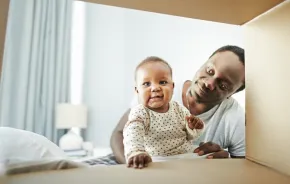Instead of sending a holiday card and a newsy letter this year, many parents will blog their way through the holidays, as they do through every other season. Online social networking is an idea made for mommies and, for that matter, daddies. Even on days when it seems you don’t have two seconds for yourself, you can hop online to check a message board, post a picture or rant about not having two seconds for yourself. Still in your jammies? Your online friends don’t care. Ditto if you have spit-up on your shoulder or hair that hasn’t been cut in six months or raccoon eyes because you were up all night helping with homework. In fact, all of those characteristics might actually bring you closer to other online parents.
Valuable as online connections may be, they aren’t the same as offline friendships, and they can expose families to risk. When kids go online, parents remind them to be skeptical about people they encounter and cautious about posting personal details. They need to give themselves the same lecture! After all, when people make friends offline, they depend upon hundreds of unconscious clues to decide whether the other person is trustworthy. Without even realizing it, you notice things like eye contact, the quality of the other person’s smile, the kind of clothes they wear and, maybe most importantly, how they interact with their kids. But online, clues are minimal. That opens up lots of opportunities not only for misunderstanding, but also for exploitation.
Unfortunately, even parents who are very protective of their kids offline become surprisingly candid and trusting when they get in front of a keyboard. Perhaps they are lulled into complacency by the sense of community fostered by many parenting discussion boards and blogs. Perhaps they haven’t thought carefully about the boundary between a child’s right to privacy and a parent’s desire for connection. Whatever the reason, parents who make public posts about their kids do expose their families to bullies, griefers (who go online just to harass others) and even predators who harvest information about when kids go to the playground or when the family will be out of town. Here are some suggestions about how to benefit from online networking without exposing yourself or your family to unnecessary risks:
Limit identifying information. You probably wouldn’t post your family name, much less your address and phone number, but, if you have your own domain name, predators can find that information on a site called Whois?. That means you’ll want to be wary about posting other details about the routines of family life. Blogging one day about what the kids are getting for the holidays and another day about how much you love midnight services is almost an invitation to thieves. Also, avoid details that would allow someone to pinpoint your child. Stray bits of information — the dance studio you frequent, favorite restaurants, the name of a child’s school team — can all be used by a predator to profile a child.
Post photos that don’t compromise privacy. Parents have been sharing snapshots of their kids since the camera was invented. But just because posting pictures of children online has become commonplace doesn’t mean it’s not risky. If you do post photos, use tight close-ups; background details may reveal a child’s location. Avoid bathtub shots and other pictures that show skin. And don’t post pictures or stories that might embarrass your child now or in the future.
Think long term. Every parent needs to be able to share the joy, frustration, pride and worry that are part of raising a child. There is, however, an important difference between confiding a touching, hilarious or distressing moment over coffee and writing about it online. When you write for an online audience, the details become a public and permanent part of your child’s record. Parents need to think carefully about what kind of online history they are creating for their kids.
Be polite — especially when you disagree. Researchers argue about why people are more blunt and less courteous online. Some think it’s because we don’t have all the extra cues that come from facial expressions and tone of voice. Others think people tend to leap to conclusions about other people when online, filling in details from relatively small amounts of information. Whatever the reason, anyone who’s been online very long knows how easy it is for feelings to get hurt and hostilities to escalate. To avoid unnecessary friction, give others the benefit of the doubt. Be patient. Be kind. Be supportive. Build community whenever you can.
Carolyn Jabs has an M.A. in online ethics and is the mother of three computer-savvy kids. She can be reached at www.growing-up-online.com or carolynjabs@carolynjabs.com.
This article originally appeared in the Fall, 2008 issue of BabyMap.









